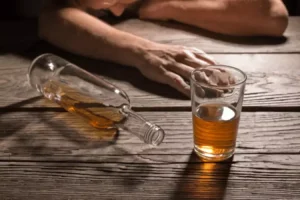Memory loss, violence and fading inhibition: What actually happens to your brain when you’re drunk?

Stick to drinking within the Australian alcohol guidelines of no more than four standard drinks on a single occasion. Reports of a study linking different kinds of alcoholic drinks with different mood states were making the rounds recently. The research used 30,000 survey responses from the Global Drug Survey and found that people attached different emotions to different alcoholic drinks. The faster you consume your drinks, the higher your BAC. You can’t really predict how long you’ll stay drunk, and try as you might to stop being drunk faster, there’s nothing you can do to lower your BAC once you’ve started drinking.
- Prolonged use of alcohol is toxic to neurons and can result in neuron death.
- People who frequently drink may feel less drunk than those who do not.
- It can’t be overemphasized that this chemical explanation doesn’t imply that such negative thoughts and feelings didn’t already exist within you, but simply that you knew better than to give voice to them.
- The incident alarmingly raised the question as to whether he meant what he said—namely, about Jews being responsible for all world wars.
- The cabbie wakes you up and you stumble up your stairs and into your bed, destroying everything in your path.
What it feels like
This research stream is limited by the fact we really only know about the drinking motives of those in their teens and early 20s. Our understanding of why adults are drinking is limited, something our research group is hoping to study in the future. It’s easy to see alcohol consumption being a result of thousands of years of ritual and a lifetime of habit. But have you ever stopped to consider why it is you choose to drink?
Other major factors
Alcohol abuse and binge drinking are common, and they put many people at risk of alcohol poisoning, alcohol addiction, and chronic alcohol-related health problems. Over time, excessive alcohol use can cause liver health problems such as cirrhosis. Chronic drinking can even cause dementia by causing a dangerous vitamin B-1 (thiamine) deficiency. While some find it fun to get a buzz from drinking alcohol from time to time, consuming too much of it can be downright dangerous. This tipsiness begins when alcohol enters the body’s bloodstream and starts to affect the functions of the brain and https://ecosoberhouse.com/ body.
How we reviewed this article:

Alternatively, if you are trying to drink your problems away, it’s worth remembering those problems will still be there in the morning. Delaying emergency care increases the risk of serious health issues, including death. When that first drop of delicious alcohol i like being drunk hits your tongue, your mind and body are taken to another place.
Get the help you need from a therapist near you–a FREE service from Psychology Today. Howl at drug addiction treatment the Moon can host awesome birthday parties, bachelor parties, bachelorette parties, holiday parties, corporate events and more. It helps to be familiar with the signs of being drunk so you know what to expect, when to stop it, and when to get help. A person is at greater risk of injury when they are tipsy.

A person will enter the euphoric stage of intoxication after consuming 2 to 3 drinks as a man or 1 to 2 drinks as a woman, in an hour. You might have a slower reaction time and lowered inhibitions. Older people, people who have little experience drinking, females, and smaller people may have a lower tolerance to alcohol than others. Taking drugs before drinking and/or not eating can also increase the effects of alcohol on the body. Usually a man will start to feel tipsy after consuming 2 to 3 alcoholic drinks in an hour. A woman will feel tipsy after consuming 1 to 2 alcoholic drinks in an hour.
Because alcohol changes the way the brain processes information, it also makes it difficult for people to make suitable decisions or assess their own behavior. For example, people who are very drunk might underestimate how intoxicated they are. Heavy drinking tends to cause more serious intoxication and may eventually cause serious health issues, such as blackouts or kidney failure. According to the 2015 National Survey on Drug Use and Health, 70.1% of adults in the United States report drinking alcohol during the past year. You wake up in the morning with a pounding headache, sick to your stomach, with some unidentifiable sauce all over your face.
- While these conditions can take time to develop, more immediately, most people don’t feel as well the day after a night of drinking, even if it was only a couple of drinks.
- But the threat of their also surfacing, in reality, is greatly magnified when you’ve been heavily imbibing.
- How much alcohol you consume plays a role in how long you’ll stay drunk.
- Subtle differences in brain function, personality and social development can determine whether you’re a lion or a pussycat when you drink.
- From what I’ve found out in sobriety, regular blackouts are actually not normal, and are in fact one of the major symptoms of alcoholism.
Americans Are Drinking More Alcohol Than Ever
You check your phone to see thirty new numbers in it of people who you have never heard of. You remember that “cutie” from the bar and your stomach starts to hurt even worse. This is the point in the night where conversations reach their peak volume. Suddenly everybody in the bar is your new best friend and you are dying to tell them your life story.

Incapable to loving myself or any version i have created. I am simply a rock, skipping over ever trauma like a ripple in the soft river flow. I’m not trying to sound like a prude or snobbish, this is just how I feel. And you can say „Well if you don’t like drunk people, don’t be around them”, and I quite frankly think that’s bullshit.
- When you have a drink, ethanol enters the bloodstream through the stomach and small intestine and is then processed in the liver.
- Next time you have a drink, think about why you are choosing to do so.
- High people I can deal with, because they’re usually so spaced out they don’t bother anybody.
- But have you ever stopped to consider why it is you choose to drink?
- And, not surprisingly, in the moment, that can make you feel happy, even euphoric.
- There are few if any persons for whom you feel just one unadulterated emotion.
Slower Brain Response
And, not surprisingly, in the moment, that can make you feel happy, even euphoric. But although under the influence you may well act differently, that in itself doesn’t mean that drinking reveals—or can reveal—who you actually are. Moreover, the problem isn’t just the inebriated person’s inaccurately perceiving risk, it’s also their taking risks that are unwarranted, foolish, or precarious. And since one’s intellectual operations are undermined by drink, one is more likely to misperceive the intentions of others and react to them more aggressively. If uncertain about whether a person’s alcohol consumption is an emergency, err on the side of caution.
 KONTAKT Z EKSPERTEM
KONTAKT Z EKSPERTEM


 DRUK
DRUK